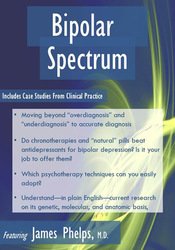Description
- Moving beyond “overdiagnosis” and “underdiagnosis” to accurate diagnosis
- For patients with complex depressions but not mania: How does the DSM-5® mixed features specifier and Not Elsewhere Classified category apply?
- Psychotherapy is now routine bipolar treatment -- but which techniques can you easily adopt?
- Do chronotherapies and “natural” pills beat antidepressants for bipolar depression? Is it your job to offer them?
- What is bipolar disorder anyway? Understand—in plain English— current research on its genetic, molecular and anatomic basis.
Cut through the hype about bipolar disorder. This seminar brings up-to-date evidence to the practical level: treating clients. How will the DSM- 5® changes affect diagnosis of bipolar disorders? Is the “bipolar spectrum” represented? We will use case examples to incorporate the DSM-5® changes in your diagnostic process without getting caught up in the details. This includes routinely assessing and documenting – simply and efficiently – bipolar markers that do not appear in the DSM®, to make your diagnoses rigorous and reliable.
The time has come for psychotherapy to stand alongside medication approaches in the routine treatment of bipolar disorder. We will review “chronotherapy,” Social Rhythm therapy, and several PsychoEducation techniques that you can immediately apply with clients. The controversial role of antidepressants in treatment of bipolar depression, and the role of therapists in guiding patients toward non-medication and “natural” treatments will complete this tour through Bipolar Controversies. Dr. Phelps will help you practice (safely) the use of these techniques and tools in a lively day of laughter and learning. You will emerge enthused and ready to use at least three new approaches with patients the very next day.
This seminar will provide you with the understanding and tools to:
- Use up-to-date instruments like the Bipolarity Index, the Bipolar Spectrum Diagnostic Scale and the Hypomania Checklist
- Differentiate bipolarity from anxiety disorders, ADHD, personality disorders, and substance use—with an eye on treatment differences
- Help patients and families come to terms with multiple variations of bipolar disorder, from initial diagnosis to long-term management
- Practice psychotherapy in concert with medications, including the 3 main medications used in bipolar depression
- Position yourself with primary care providers who are using or developing a Medical Home model
- Make bipolar disorder one of the conditions you’re comfortable identifying – and treating
CPD
CPD
This online program is worth 6.25 hours CPD.
Speaker
Director of the Mood Disorders Program
Samaritan Mental Health
James Phelps, MD, specializes in complex mood and anxiety problems. He has focused on teaching about non-manic versions of bipolar disorder for over 10 years. His website, www.PsychEducation. org receives 20,000 visitors a month. Dr. Phelps is the author of Why Am I Still Depressed? Recognizing and Managing the Ups and Downs of Bipolar II and Soft Bipolar Disorders (McGraw-Hill, 2006). He authored revisions of the diagnostic criteria for bipolar spectrum disorders for the International Society for Bipolar Disorders. He has published multiple articles and reviews for peer-reviewed journals, including the Journal of Affective Disorders and Chronobiology International. He was recently named Bipolar Disorders section editor for Psychiatric Times. He has received numerous awards for his teaching including Teacher of the Year awards from both the Psychiatry and Family Medicine departments at the University of New Mexico, and from his current hospital’s residency program. Dr. Phelps received his M.D. from Case Western Reserve University. He completed his residency in psychiatry and a fellowship in medical education at the University of New Mexico. He holds an undergraduate degree in Human Biology from Stanford.
Speaker Disclosures:
Financial: James Phelps receives royalties as a published author. He receives a speaking honorarium and recording royalties from PESI, Inc. He has no relevant financial relationships with ineligible organizations.
Non-financial: James Phelps is a member of the International Society for Bipolar Disorder. He is the founder and medical director of DepressionEducation.org.
Objectives
- Recognize the DSM-5® changes and use them in diagnosis of unipolar mixed states (as well as bipolar disorders).
- Utilize effective screening tools including the Mood Disorders Questionnaire or the Bipolar Spectrum Diagnostic Scale, and the Hypomania Checklist.
- Assess 11 non-manic bipolar markers efficiently.
- Implement Social Rhythm Therapy and use some elements of chronotherapy including light/dark management, dawn simulators, light therapy, and patient education.
- Recognize current medication strategies and how to integrate these with psychotherapy (e.g. avoiding antidepressants).
- Use virtual darkness and motivational explanations thereof to foster regular sleep hours and rational approaches to late night TV, Internet and light.
Outline
Over? Under? Or Accurate Diagnosis
- Case example: the Brown Univ. “overdiagnosis” study
- Compare the data in children/adolescents
- Remembering 4 moods and 7 criteria for hypo/mania
- Screening tools to efficiently gather information
- DSM-5® hypomania-duration: still 4 days?
Eleven Non-Manic Bipolar Markers
- Case example: not bipolar, but not unipolar?
- Where did these non-manic markers come from? Who uses them? Should you?
- How can you remember them? WHIPLASHED
- Using a screening tool instead of memorizing
- A system for reporting: The Bipolarity Index
Is there a “Bipolar Spectrum”?
- Case example: implications for treatment
- DSM-5®’s mixed features specifier : Is that a “spectrum” step?
- What is the therapist’s role in guiding treatment?
- How to educate patients/families? (and doctors?)
Differentiating bipolar from X,Y,Z
- Case example: PTSD or bipolar or both?
- The overlapping criteria problem
- What will happen if you’re wrong?
- Is it all about antidepressants?
What is “bipolar disorder” anyway?
- Depression is not a moral weakness
- One gene can make that much difference?
- Fighting stigma with information
- Where is depression located in the brain?
Treatment: A Big-Picture View
- Case example: Balancing risk, benefit – and data!
- Antidepressants can make bipolar disorder worse, 5 different ways
- Psychotherapy is an integral component, not an add-on!
- Non-medication mood stabilizers: An example in darkness
- Remembering nine alternatives to antidepressants
- Practicing in or in concert with a Medical Home model
Social Rhythm Therapy
- Case example: What time to bed?
- The Social Rhythm metric (easy)
- Selling rhythm? What a challenge!
- Selling darkness is easier
- What to do about TV, Internet, texting
Using components of Triple Chronotherapy
- Case example: Treating depression without medications
- Three ingredients: Darkness, light, and timing
- Is this do-able in your practice?
- Why isn’t this more widely used?
Bipolar Therapy Manuals
- Case example: Old therapist, new technique
- What are you looking for? (BP I? BP II? Spectrum?)
- Common ingredients list
- Comparing four manuals: Which is yours?
Medication approaches
- Case example: lithium or lamotrigine?
- Why it boils down to 3 main options for depressed phases
- FDA indications and “evidence-based medicine”: A Pharma’ scam?
- Fish oil and NAC (n-acetlycysteine); can you suggest?
- How about Vitamin D? tryptophan?
How bad are antidepressants?
- Case example: Here’s why you should worry
- Do antidepressants even work in bipolar disorder? (or unipolar?!)
- Mixed states, rapid cycling are worse than “switching”
- Speculation: “Kindling” and “tardive dysphoria”
- Withdrawing antidepressants: 31 tricks from Dr. Tam Kelly
For fun, before we go
- Have your darkness and eat it too
- The science of virtual darkness
- Accumulating evidence for efficacy
- How to explain and prescribe virtual darkness
Target Audience
Counselors, Psychotherapists, Social Workers, Nurses, Psychologists,
Case Managers, Addiction Counselors, Therapists, Marriage & Family Therapists,
Other Mental Health Professionals
Reviews
Overall:
4.8
Total Reviews: 6


 Frank Anderson’s Master Class in Internal Family Systems Therapy£129.98Frank Anderson’s Master Class in Internal Family Systems TherapyFrank Anderson’s Master Class in Internal Family Systems Therapy£129.98
Frank Anderson’s Master Class in Internal Family Systems Therapy£129.98Frank Anderson’s Master Class in Internal Family Systems TherapyFrank Anderson’s Master Class in Internal Family Systems Therapy£129.98 Dr Laurel Parnell’s Attachment-Focused EMDR Skills and Supervision Group£495.00£1,590.00 valueDr Laurel Parnell’s Attachment-Focused EMDR Skills and Supervision Group14 Jan, 2025Dr Laurel Parnell’s Attachment-Focused EMDR Skills and Supervision Group£495.00£1,590.00 value
Dr Laurel Parnell’s Attachment-Focused EMDR Skills and Supervision Group£495.00£1,590.00 valueDr Laurel Parnell’s Attachment-Focused EMDR Skills and Supervision Group14 Jan, 2025Dr Laurel Parnell’s Attachment-Focused EMDR Skills and Supervision Group£495.00£1,590.00 value Written by three leading experts in the fields of disordered eating, mental health, and trauma-informed care, this book will become your go-to guide for learning how to reject diet culture, heal your£18.99Written by three leading experts in the fields of disordered eating, mental health, and trauma-informed care, this book will become your go-to guide for learning how to reject diet culture, heal yourWritten by three leading experts in the fields of disordered eating, mental health, and trauma-informed care, this book will become your go-to guide for learning how to reject diet culture, heal your£18.99
Written by three leading experts in the fields of disordered eating, mental health, and trauma-informed care, this book will become your go-to guide for learning how to reject diet culture, heal your£18.99Written by three leading experts in the fields of disordered eating, mental health, and trauma-informed care, this book will become your go-to guide for learning how to reject diet culture, heal yourWritten by three leading experts in the fields of disordered eating, mental health, and trauma-informed care, this book will become your go-to guide for learning how to reject diet culture, heal your£18.99 This workshop provides crucial insights into the intersection of AI and therapy, equipping therapists with the knowledge to navigate this new landscape confidently.£0.00£149.00 valueThis workshop provides crucial insights into the intersection of AI and therapy, equipping therapists with the knowledge to navigate this new landscape confidently.7 Nov, 2024This workshop provides crucial insights into the intersection of AI and therapy, equipping therapists with the knowledge to navigate this new landscape confidently.£0.00£149.00 value
This workshop provides crucial insights into the intersection of AI and therapy, equipping therapists with the knowledge to navigate this new landscape confidently.£0.00£149.00 valueThis workshop provides crucial insights into the intersection of AI and therapy, equipping therapists with the knowledge to navigate this new landscape confidently.7 Nov, 2024This workshop provides crucial insights into the intersection of AI and therapy, equipping therapists with the knowledge to navigate this new landscape confidently.£0.00£149.00 value













